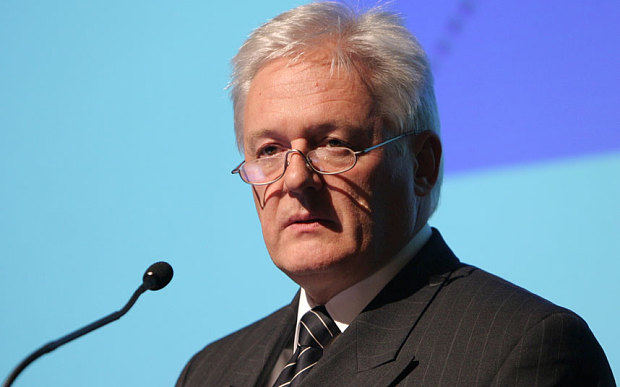
John McFarlane
Photo: i.telegraph.co.uk
Barclays chairman attacks banking’s bonus culture
The chairman of Barclays, John McFarlane, speaking the Annual International Banking Conference in London on 22 October strongly criticised the bonus system for investment bankers, arguing it encourages people to “cut corners”, noting that eliminating “geared incentives in retail or investment banking” would “remove the temptation to cut corners”.
He further made the comment that the flaws of the bonus system had been exposed by the financial crisis when “most of the returns at investment banks went to employees and not to shareholders and I think that game is over”.
Speaking to reporters as he left the conference, Mr McFarlane said that bonuses were “a model that was imported from the US and seems to suit those [US] institutions”...
Barclays chairman attacks banking’s bonus culture - FT.com#axzz3pMm7uXP4
Annual International Banking Conference 2015 | BBA
I always knew that it was only a matter of time for wisdom to prevail and the common good to triumph. This is only the beginning, but nonetheless, a very sweet start.
It goes without saying that I am very pleased to note what the Chairman of Barclays has said. This is indeed about time, as makes me feel happy that more and more people within the industry are coming to realise that at the end, one can only succeed if the actions taken are in the interest of the common good:
"To find those answers we need to appreciate that the ethos of neo-liberalism is destructive of the very SDGs we are seeking to establish in our relationships in society and with Mother Nature. The current neo-liberal capitalist paradigm – economic liberalization, marketisation, privatisation, free trade, endless economic growth, profit-maximisation, cost-minimisation, fierce competition, huge bonuses for short-term gains, and more – provide strong incentives to ignore distributive justice and ecological sustainability.
When economics and politics are based on the worst aspects of human nature, then societies become riddled with inequality, violence and mistrust." … Sustainable Development Goals: Where is the Common Good?
"On the evening of Wednesday 20 May 2015 at the invitation of the World Congress of Faiths I delivered a keynote speech ('The Value of Values to Build a World for the Common Good') at their Annual General Meeting which was held at The Alumni Theatre, London School of Economics.
It was very telling and ironic that as I was delivering my lecture, shedding light on what has gone wrong with the so-called modern economics, values-less business education and more, the breaking news was that despite what has happened before and since the financial crash of 2008, the banks have been continuing and deepening their corrupt activities. In order to inflate their profits and increase their bonuses significantly, they have jeopardised the global economy and have endangered the livelihood and well-being of billions of people. This time the culprits were engaged in rigging the $5.3trn-a-day foreign exchange market. "If you ain’t cheating, you ain’t trying,” one Barclays’ trader is noted to have said."… Values, Ethics, and the Common Good in MBA rankings: Where are they?
And in conclusion it is worth remembering that the former CEO of Barclays, the disgraced Bob Diamond (The Libor Man, amongst others), in his BBC lecture, had lovingly claimed Milton Friedman to be his 'favourite economist'!
Diamond said: “In 1970 Milton Friedman - who happens to be one of my favourite economists - wrote an influential article saying that the only social purpose of business is to increase its profits.”
Milton Friedman, his favourite! No wonder he had to resign as the CEO of Barclays in disgrace.
Read more about Bob Diamond and his favourite Milton Friedman:
Britain engulfed in corruption: The dark side of working for Diamond’s Barclays Capital!
The Destruction of our World and the lies of Milton Friedman
People’s Tragedy: Neoliberal Legacy of Thatcher and Reagan
I wonder who John McFarlane’s favourite economist is? He can call me any time he wants for the common good!
Dear Mr. McFarlane, I am sure you will agree with me that:
"Good economists must acknowledge that, there is a need to go well beyond the standard models and the typical mathematical assumptions. We must reach out more deeply and more broadly for wisdom. Now is the time for a revolution in Economic thinking.
Economists must find ways to incorporate all of the lessons in equality, social justice, ecological balance, and respect for the earth, community and relationship into its standard approach. And that incorporation will be the revolution in economic thinking for which I am calling.
Economics must change. Economists must change. What we teach students must change. It must change if it is to play a constructive role in solving the multiple and multi-dimensional crises that have engulfed our world, our species, the fabric of human community, relationships, and the web of life. We are running out of time. If our discipline does not change, if the revolution in thinking we have called for does not happen, if we do not revisit the rich and fertile soil from which our subject sprang, that is moral philosophy, to find answers to the broader questions of human existence, meaning of life, and ecology, then not only will we have retreated from the chance to play a constructive role in solving these crises, we will inherit well deserved scorn and contempt. The opportunity is upon us. Let us seize it. Carpe Diem!"
Dismal Scientists Discover the Truth: The Prize is not Noble and Economics is not a Science
